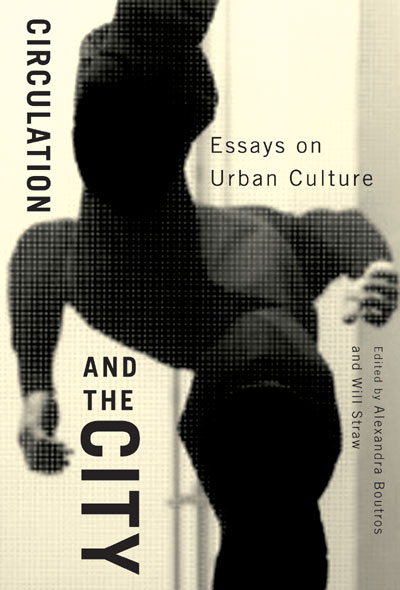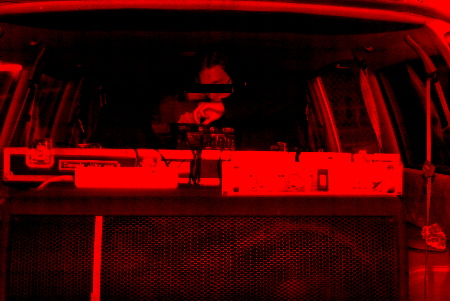With appropriate fanfare & deep bows, Will Straw & Alexandra Boutro’s edited volume entitled Circulation and the City: Essays on Urban Culture (McGill Queen’s UP, 2010) now graces the shelves. This book has been quite a few years in the works. The earliest drafts I have of work for the volume date back to 2005, and by the time we went to press, the final chapter I submitted on Henri Lefebre, rhythm, and revolution in the city had been transformed entirely from the words originally writ on rave culture and rhythm (funny thing: the new article I am finishing for Dancecult picks up on these earlier themes – sometimes work must encounter different sets of theoretical concepts, and years of reflection, for the excavation of the intellect to yield its bounty). The book forms the third in a trilogy of publications from the Culture of Cities Project, a multi-university research endeavour that sought to unearth “the mix of universal and local influences in the everyday life of cities,” with research concentrated in Toronto, Berlin, Dublin and Montréal, and with researchers across Canada and the Continent. So, with the intent of lurking y’all into picking this up (or perhaps unwittingly scaring you off), I offer the introduction to my chapter “Cities of Rhythm & Revolution.”
Until August 2010, here be the 20% off code: enter BSTRAW10 at checkout through MQUP.
Cities of Rhythm & Revolution
// tobias c. van Veen
The urban problematic, urbanism as ideology and institution, urbanization as a worldwide trend, are global facts. The urban revolution is a planetary phenomenon. – Henri Lefebvre, The Urban Revolution (2003, 113)
Like Seeds in a Sack: the State and Urban Revolution
A revolution happens somewhere: in a city, a springtime revolt, the unexpected uprising, the insurgency of the city against its occupiers, whether military or monetary – these are all the classic forms. In the violence, boredom and exhaustion of the 21C,[1] there are revolutions in product design, software, advertising and taste while the upheavals that remake the world are rarely granted the dubious privilege of ‘revolution’. Despite its broad application, or rather, the attempt to render its force banal by subsuming it to the language of consumption, ‘the revolution’ nonetheless maintains an exclusive meaning when it comes to the remaking of the world as such. And this remaking has had particular import by way of the City: it is the City that is the locus of the State.[2]
What is the City that it overwhelms the world with a concentrated force, that it, once expressed as ‘the urban’, a tendency of the city to globalize, becomes the engine of history? Such would be Lefebvre’s ‘urban revolution’, the city as the dominant global manifestation in which a new form of the social emerges: the “urban society” (Lefebvre 2003: 5). The urban supercedes the agrarian and overtakes not only the country but even the city itself – for once all is woven within the urban fabric, the city loses its particularity, its oppositional architecture to the country’s expanse: “The urban fabric grows, extends its borders, corrodes the residue of agrarian life. This expression, ‘urban fabric’, does not narrowly define the built world of cities but all manifestations of the dominance of the city over the country” (3-4). But what is the city? Society? The country? A dialectical comment by Deleuze and Guattari on the matter, writ around the same time as The Urban Revolution (1970, trans. 2003), teases out the ambiguity of Lefebvre’s hypothesis remarkably well:
It is not the country that progressively creates the town but the town that creates the country. It is not the State that presupposes a mode of production; quite the opposite, it is the State that makes production a ‘mode’. The last reasons for presuming a progressive development are invalidated. Like seeds in a sack: It all begins with a chance intermixing. The ‘state and urban revolution’ may be Paleolithic, not Neolithic…. (Deleuze and Guattari 429)
Deleuze and Guattari challenge the – traditional, Marxist, liberal, linear, etc. – narrative of humanity’s ‘progressive development’ (from nomads to cities, agrarian to urban) by arguing that the progressive timeline that would posit the emergence of the City-State at a specific moment in the ‘linear development of civilization’ falls prey to tautology in its quest for the origin and evolutionism of historical succession (427-428). Theses “on the origin of the State are always tautological” not only because they fall into tautology, but because the State is tautological. In fact, according to Lefebvre, it is because all “logics,” including that of the state and the law, commodities, the organization of space, the object, daily life, language, information and communication want “to be restrictive and complete, eliminating anything that is felt to be unsuitable, claiming to govern the remainder of the world,” that they become “an empty tautology” (2003: 35). This tautology, however, is not meaningless: its emptiness shares a common point in the accumulation of surplus value in the city. Thus Deleuze and Guattari “are always brought back to the idea of a State” – as an “apparatus of capture” – “that comes into the world fully formed and rises up in a single stroke, the unconditioned Urstaat,” to which we might add its dimensional aspects: centripetal, circular, enclosing, inscribed in the corridors and walls of the polis (427). The City-State emerges with the origin of History itself:
Economic evolutionism is an impossibility… An evolutionary ethnology is no better… Nor an ecological evolutionism… All we need to do is combine these abstract evolutions to make all of evolutionism crumble; for example, it is the city that creates agriculture, without going through small towns. To take another example, the nomads do not precede the sedentaries; rather, nomadism is a movement, a becoming that affects sedentaries, just as sedentarization is a stoppage that settles the nomads. (Deleuze and Guattari 430)
Let us make quick work of this moment – for the radically anti-evolutionary, nondevelopmental thesis of a “coexistence of becomings” (against which “history translates into a succession”) (ibid.), is also to be found in Lefebvre. It is found in the complex interplay of the ‘urban’, wherein the urban anticipates its own realization as the ‘virtual’ horizon of its own becoming.[3] Lefebvre is quite aware of Simondon’s theory of transduction (2003: 5) which will later be incorporated by Deleuze and Guattari when encountering this exact problem: the virtual.
The urban, like Deleuze and Guattari’s Urstaat, always seems to have coexisted in the tension between city and country, as the fabric of their antinomy, though one might argue – as Lefebvre will – that the urban has now become the Ur-apparatus of capture, the overwhelming of all other becomings wherein both city and country dissolve within the urban fabric. And it is certainly the case that Lefebvre’s insistence on the urban as the global revolution – if not as the production of globalization per se – derails the dialectical succession of history and empties it of its content, for the urban revolution swaps out history’s engine, the relations of production, for an ambiguous and virtual fabric, Ur-becoming, that is the urban itself. This is one tendency of Lefebvre, and one which I shall insist on, to draw out its heterodoxy, to amplify all that it has to say, and to emphasize its precedent to Lefebvre’s later technique of rhythmanalysis. Not surprisingly, then, the samizdat concept that is the urban upsets the orthodoxy of teleological history: the virtual-urban, the becoming-urban, in-forms the present material reality.
Can the transductive logic of the urban, even if thought as synchrony, function within a linear development of history? Lefebvre insists upon the diachrony of urban history – a dialectical progression of the urban – all the while arguing that the ‘impossible’ barriers to the urban realization, erected on the horizon of the virtual object, must be torn down (2003: 7; 17). The impossible is reduced to a possibility to be overcome. The tension between becoming and historical succession, diachrony and synchrony, transduction and economic evolutionism develop a kind of rhythm – unresolved, impossible, aporetic, even – that is taken up at length in the complex thought of The Urban Revolution – and later in the problematic of rhythm itself, in Rhythmanalysis.
Works Cited
Deleuze, Gilles and Félix Guattari. 2000. A Thousand Plateaus: Capitalism and Schizophrenia. Trans. Brian Massumi. Minneapolis: U Minnesota P.
Lefebvre, Henri. 2003. The Urban Revolution. Trans. Robert Boronno. Minneapolis: U Minnesota P.
–. 2004. Rhythmanalysis: space, time and everyday life. Trans. Stuart Elden and Gerald Moore. London: Continuum.
Endnotes
- “21C” is here abbreviated to designate the binarization – or digital codification – of the historical timeline as the archives of humanity become accessibly only through complex technological systems. The soundbyte style of “21C” can be attributed to DJ Spooky’s defunct magazine of the same name (RIP). [↩]
- “City,” as well as “State,” are here capitalized in accordance with the work of Lefebvre, where the signifiers attain a quasi-atemporal status, as if referring to a near a priori manifestation of human activity. Thus, at times, I refer to “cities” or a particular city in contrast to the City (a city’s ur-principle of centripetal control). Likewise for “the revolution,” which is marked by the near teleological destination of its pronoun, and later, Negri and Hardt’s deployment of “Empire” to demarcate an organisational command that exceeds the nation-state. [↩]
- Lefebvre will write of the urban how “its complexity surpasses the tools of our understanding and the instruments of practical activity,” serving as a “constant reminder of the theory of complexification” (2003, 45). If our missive bows to such a theory, it is in part because any would-be Occam’s Razor would only prove that simplism empties itself out in reductionism. The law of parsimony (Pluralitas non est ponenda sine necessitate) should read: Reductio non est ponenda sine necessitate. [↩]
Tags: Coming Insurrection, disappearance, exodus, Lefebvre, rave culture, rhythm, rhythmanalysis, TAZ
.tinyUrl for this post: | https://tinyurl.com/yac22vx8 .






 RT
RT 
"Cities of Rhythm & Revolution" > new article in -Circulation & the City- volume, ed. Will Straw & Alexandra Boutros http://bit.ly/dB8BoY
RT @fugitivephilo: "Cities of Rhythm & Revolution" > new article in -Circulation & the City- volume, ed. Will Straw & Alexandra Boutros http://bit.ly/dB8BoY
RT @fugitivephilo Cities of Rhythm & Revolution http://bt.io/EhF9